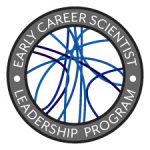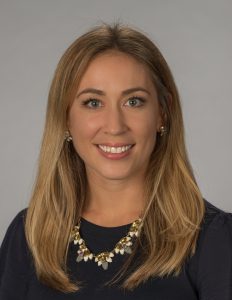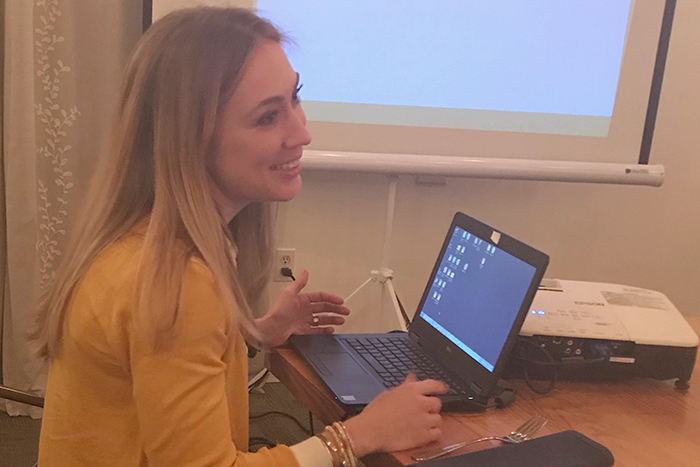 Medical science liaison Ashlyn Ritter’s passion for science communication was a perfect match for her career. She shares tips on how to branch out of academia and be creative about the networking process.
Medical science liaison Ashlyn Ritter’s passion for science communication was a perfect match for her career. She shares tips on how to branch out of academia and be creative about the networking process.
In the Decoding Life series, we talk to geneticists with diverse career paths, tracing the many directions possible after research training. This series is brought to you by the GSA Early Career Scientist Career Development Subcommittee.
Ashlyn Ritter’s graduate training at University of Massachusetts Medical School provided her the ideal opportunity to learn about the medical training environment. While exploring her career options, she learned that networking is key for obtaining a position as a medical science liaison and encourages early career scientists considering this career to build their professional network and learn about corporate structure and healthcare. Using LinkedIn, Ashlyn identified professionals who could teach her about the role, requirements, and day-to-day life. She now works as a medical science liaison at the biopharmaceutical company AbbVie, covering a range of conditions including virology, women’s health, neuroscience and metabolics.
What does a job as medical science liaison entail?
 The main responsibility of a medical science liaison (MSL) is to lead scientific discussions with healthcare providers about new research regarding particular disease states, technologies, medical devices or therapies. The goal is to communicate scientific data to help physicians make informed decisions when caring for their patients.
The main responsibility of a medical science liaison (MSL) is to lead scientific discussions with healthcare providers about new research regarding particular disease states, technologies, medical devices or therapies. The goal is to communicate scientific data to help physicians make informed decisions when caring for their patients.
MSLs—also called medical science associates or clinical science liaisons—work in a corporate environment, but our offices are typically in our homes. We visit healthcare providers within our allocated regions, which usually include two to five states, spending a lot of time becoming familiar with the healthcare landscape and networking to establish relationships.
MSLs work within what it is called a medical affairs branch of the pharmaceutical and biotechnology industry—as opposed to sales representatives, who work under the commercial branch. Therefore, we don’t sell or promote any product or its use.
What influenced your career path and led you to become a medical science liaison?
As I went through high school and college, I quickly realized that a career in science was for me. I remember thinking, “The more I learn, the less I know.” That idea is fascinating—and scary—and it was a big driving force for me to stay in science and to pursue graduate training.
I was in graduate school for just over six years. I enjoyed teaching, learning, science communication, and the general environment of graduate school, but towards the end, I really felt that academia wasn’t aligning with my skill sets. That’s when I started to look at other career options. Since communicating science was a passion of mine, my focus was to identify a career where I could communicate science, teach, and learn. I found out about the medical science liaison role through a friend. After reading about the core responsibility, I remember thinking, “Wow, I could get paid to stay plugged into cutting edge research and to talk science all day? I have to check this out.”
What advice do you have for trainees interested in a career as medical science liaison?
Academia does a great job in developing your critical thinking, time management, and independence. Even though you may lack non-academic experience, you have the foundational skills needed to transfer outside of academia. Branch out a little to get experience looking at human health and disease from a different perspective; learn what it takes to get a device or drug to market. Build your network within the biotechnology and pharmaceutical industry. There are a lot of companies running clinical trials within academic institutions—find out who the principal investigator is and reach out to them.
It’s kind of a challenge to land your first MSL position because most positions require some experience. I suggest starting from a different point to gain that experience and visibility. For example, you could start a position in assisting the clinical trial process, in creating educational resources for pharmaceutical companies, or in working for biotech consulting companies. Additionally, the Medical Science Liaison Society has a mentorship program for people who want to become MSLs. The organization is a great opportunity for education and networking.
MSL is inherently a social role, so you have to be comfortable carrying on a conversation with a perfect stranger. I suggest spending time to develop the conversational skills that works for you. Gaining experience in scientific communication, learning about the industry, and networking are really key for you to break through.
What does a typical day at work look like for you?
 Since MSLs are given territories to cover, there is a lot of travel required. I spend three or four days a week driving to visit physician offices and institutions to discuss research through one-on-one conversations or group presentations. I occasionally attend scientific conferences to stay up to date on the cutting-edge research and technology and to get to know some of the experts in my fields.
Since MSLs are given territories to cover, there is a lot of travel required. I spend three or four days a week driving to visit physician offices and institutions to discuss research through one-on-one conversations or group presentations. I occasionally attend scientific conferences to stay up to date on the cutting-edge research and technology and to get to know some of the experts in my fields.
Besides traveling, I dedicate one day a week to focus on administrative duties and reading new publications. My office is at home, which allows a lot of flexibility in scheduling but comes with unique challenges. You have to be independently driven—which is something most graduate students, postdocs, and PIs understand.
I know you listen to many audiobooks on your road trips, could you recommend some that you are currently reading?
Right now, I am reading The Gene by Siddhartha Mukherjee, which is the history of genetics from a societal perspective. It’s a pretty dense book, but it is very interesting to take a step back from the bench and instead to look at how the field of genetics has evolved due to societal influences.
I am also reading Own the Room by Amy Jen Su and Muriel Maignan Wilkins, which is a personal development book about discovering your signature voice to master your leadership. It is about leadership presence, being able to articulate your value, and being able to influence and connect to others. Because different people respond to different styles of leadership and communications, finding what they call “signature voice” is really interesting to read.
About the author:
 Zhiji Ren is a member of the Early Career Scientist Career Development Committee and a postdoctoral fellow at Rockefeller University. He studies noncoding RNAs using C. elegans and wants to raise awareness of the variety of career outcomes available to biomedical PhDs.
Zhiji Ren is a member of the Early Career Scientist Career Development Committee and a postdoctoral fellow at Rockefeller University. He studies noncoding RNAs using C. elegans and wants to raise awareness of the variety of career outcomes available to biomedical PhDs.
Learn more about the GSA’s Early Career Scientist Leadership Program.













